Six anti-migrant protesters have been arrested, following clashes between demonstrators and the police in Epping, UK, at the weekend. The protests followed the arrest and charge of an asylum seeker last week, on suspicion of alleged sexual assaults. The issue was debated in parliament on Monday.
At least eight police officers have been injured so far, and nine people arrested in connection with violence and unrest that broke out last week in the small town of Epping, following reports that an asylum seeker was arrested on suspicion of sexual assault. The suspect denies the allegations; his trial is due to begin on August 26.
Eggs, stones, fireworks, flares and other objects have allegedly been thrown at police and their vehicles during days of protests and demonstrations.
On Sunday (July 20), police issued a dispersal order in the town to try and prevent people from gathering and protesting outside or near the Bell Hotel, a hotel housing asylum seekers in the town.
Some protesters have reportedly come from across the UK to try and "get asylum seekers out," a woman from Scotland told the BBC.
Epping is a small town on the outskirts of greater London. It is part of the county of Essex but is connected to central London by tube, train and bus.
Read Also Macron and Starmer discuss tougher joint measures to curb Channel migrant crossings
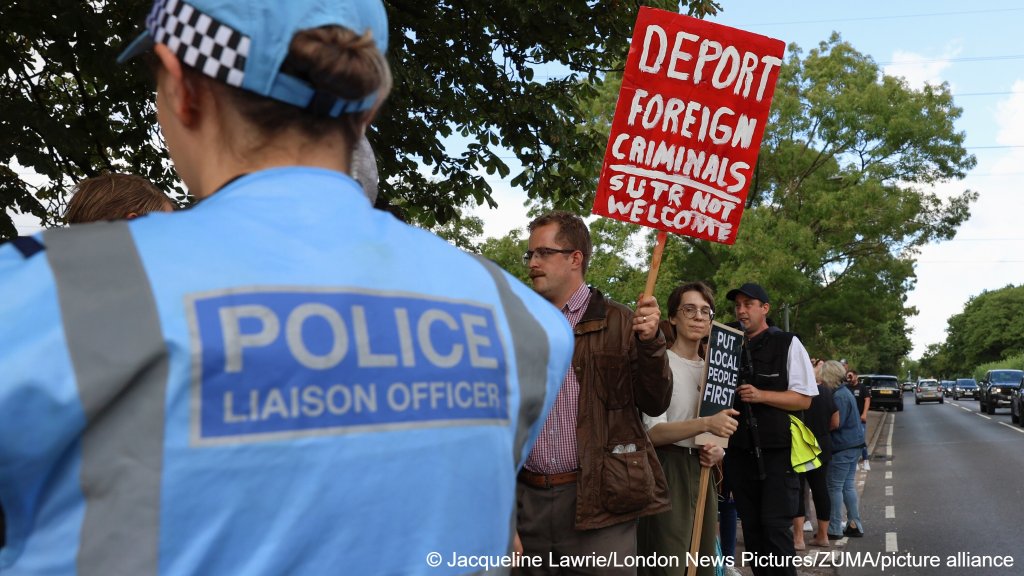
Allegations of sexual assault
According to police statements, the latest series of protests began on July 13 outside the Bell Hotel, following reports of a man acting "inappropriately towards a number of people on July 8." Officers arrived quickly and arrested that man, police said. He was then charged with three counts of sexual assault and one count of inciting a girl to engage in sexual activity, as well as one count of harassment without violence.
The man arrested is a 38-year-old named as Hadush GK, an asylum seeker from Ethiopia. In one of the alleged assaults, he is believed to have attempted to kiss a 14-year-old girl. He appeared at Colchester Magistrate’s Court on July 10, where he denied all offenses. He has been denied bail and remains in custody until his next hearing. His trial is due to begin on August 26.
'Hooliganism'
Initially, the protest was planned and peaceful, but things escalated, and the police noted that some were throwing eggs and fireworks. Six of the latest arrests, police said on Monday (July 21), were charged with violent disorder, suspicion of causing criminal damage, or "going equipped to cause criminal damage."
Chief Superintendent Simon Anslow of Essex police described the violent disorder as "not protest" but "hooliganism." Anslow said the people responsible for it "can expect to be held accountable."
The cost of policing criminal incidents in Epping has already reached over 100,000 pounds (115,000 euros), said the police.
Anslow also pointed out that some had been inciting the demonstrators by "peddling untruths" via social media and "lies about the incidents in Epping on Thursday and Sunday." He said that he was determined those people "would not win."
A spokesperson for Britain’s Prime Minister told the BBC: "Peaceful protest is a cornerstone of our democracy, but it’s clearly unacceptable to see police coming under attack as they ensure that peaceful protest is able to take place."
Epping’s Conservative MP, Neil Hudson, told the House of Commons (Britain’s lower house of Parliament) that the demonstrations had been "challenging and distressing" for local residents. He said because of the disorder, church services had been cancelled, businesses closed early and some residents felt like they were being "barricaded" in their homes.
Hudson has called on the British government to close the hotel immediately.
Read AlsoUK and France seek novel way to stop small boats amid new records
A multitude of reasons
The reasons behind the protests are multi-layered. As in several other European countries, there is anger, among some sections of the population, that in a time of economic austerity, the cost of housing asylum seekers in hotels is too high.
The arrest of the asylum seeker in Epping then focused that generalized anger. According to the police, there is also a layer of misinformation being spread on social media, which ends up attracting protestors from far and wide, and complicating the situation still further.
The issue of migration is fueling more and more political support for right-wing populists. In the UK, the Reform Party is widely reported to be leading in the polls, and it frequently calls for migration to be stopped and stricter border controls. In response, both the ruling Labour Party and other mainstream parties are attempting to appear tougher on the issue in a bid to win back voters.
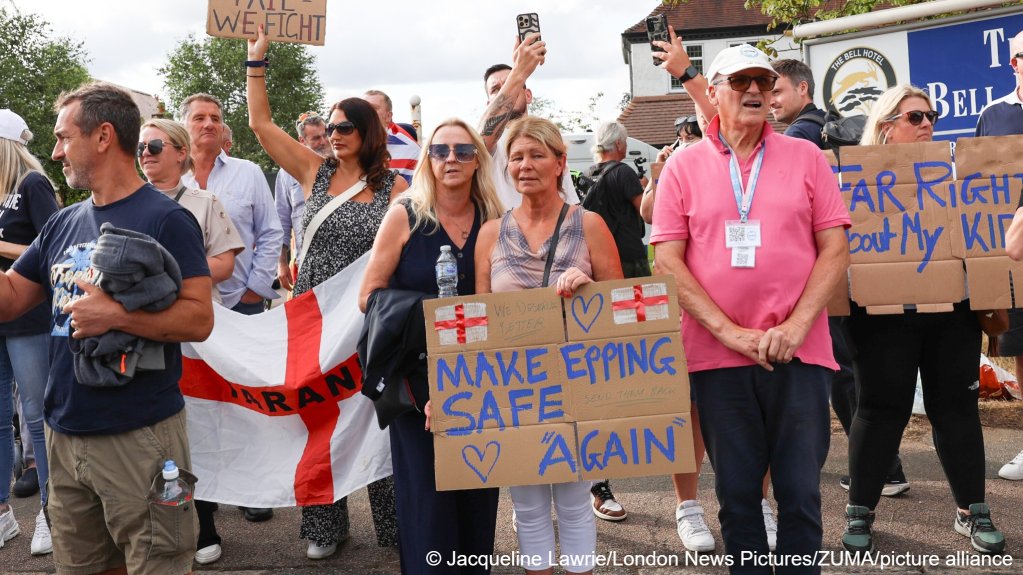
In one picture of the protests, a group of unmasked women stood behind homemade signs bearing the message, "I’m not far right, I’m worried about my kids." Some other women held a cardboard with the England flag, the red cross of St George on a white background, and hearts above a message that read: "Make Epping safe again."
Read AlsoUK: Crackdown on unauthorized gig workers
Debate in parliament
On Monday (July 21), the issue was debated in parliament. Diana Johnson, Britain’s Policing Minister, condemned the violence, calling the violent incidents "thuggery."
Johnson added, notes Hansard, the official record of all Parliamentary debates, “foreign nationals, including asylum seekers, who abuse our hospitality by breaking our laws should expect to be removed from the UK.” She added that these removals had increased by 14 percent from the previous year.
Johnson said that any individual convicted of any registered sexual offense would not be granted asylum under the changes proposed by the new Border Security, Asylum and Immigration Bill, which has not yet become law.

The issue of asylum hotels
The British government has made tackling migration a priority and has already begun to close down some of the asylum hotels and move families into alternative accommodation. However, in May, Britain’s National Audit Office (NAO) reported that the cost of housing asylum seekers is now projected to be three times higher than what the former Conservative government anticipated when it signed hotel contracts in 2019.
Back then Conservative MPs expected the cost to be 4.5 billion pounds (around 5.1 billion euros), NAO reported. Now, the costs have been projected to reach 15.3 billion pounds (around 17.6 billion euros).
Most of the increase has been attributed to far greater numbers of asylum seekers arriving than were predicted in 2019. Around three-quarters of all money spent on asylum accommodation goes to hotels, reported the BBC in May.
Speaking in Parliament on July 21, Johnson said that at the peak of hotel use in 2023, there were almost 400 hotels at a cost of almost nine million pounds a day (around 10.3 million euros). She underlined that her government was working to clear the asylum backlog left by the Conservatives and decrease the reliance on these hotels. She added there is "no quick fix to these problems."
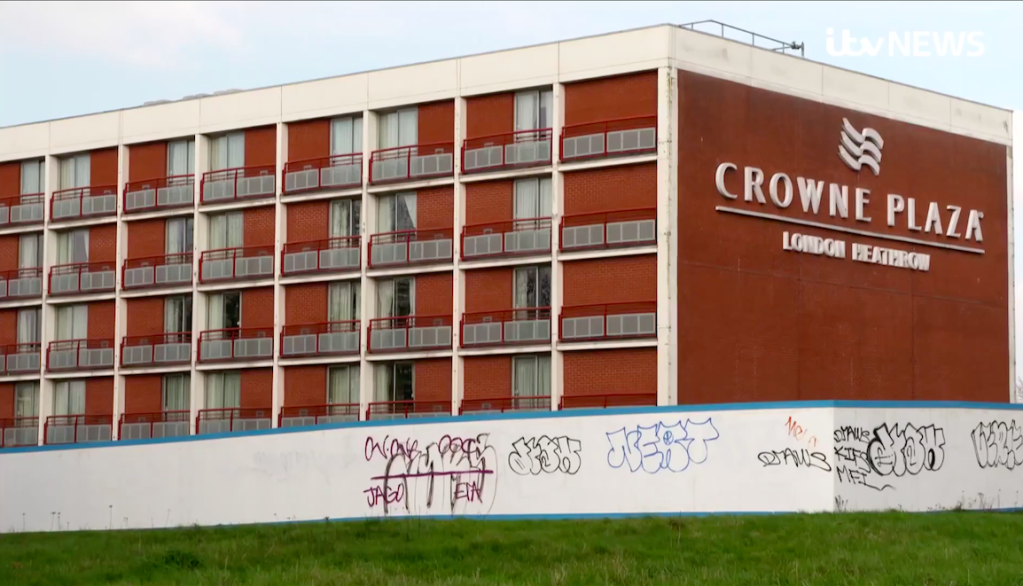
Read AlsoUK to toughen immigration rules amid political pressure
Bringing down the costs
Between September 2019 and August 2024, the three main companies providing accommodation via the hotels, Serco, Mears and Clearsprings, made a combined profit of 383 million pounds (around 441 million euros) on their asylum accommodation contracts, reports the BBC.
In June this year, Rachel Reeves, the British Chancellor (responsible for the budget and economy), pledged in her spending review unveiled in parliament that the government seeks to end the use of hotels to hold asylum seekers by 2029. This, she says, is intended to save Britain around one billion a year (around 1.15 billion euros).
The savings are expected by cutting the number of small boat crossings, as well as building new government-owned accommodation centers. It has been reported that the government is seeking to buy tower blocks and former student accommodation in order to offer alternatives to hotel accommodation. The first break clauses for the hotel contracts are expected next year, reported the BBC.
Read AlsoUK: Government to scrap contract with one of its biggest asylum accommodation providers
'A public safety crisis?'
In parliament on Monday, opposition Conservative MP Chris Philp claimed that the number of migrants to have crossed the Channel in small boats was "up 52 percent on last year" and that the "numbers in asylum hotels are now higher than at the time of the election."
He called the situation a "border security crisis, but it is also a public safety crisis, especially for women and girls."
Philp claimed that "many nationalities crossing -- for example, Afghans -- commit up to 20 times more sex offenses than average." He cited a report carried out for the government as a source for this figure.
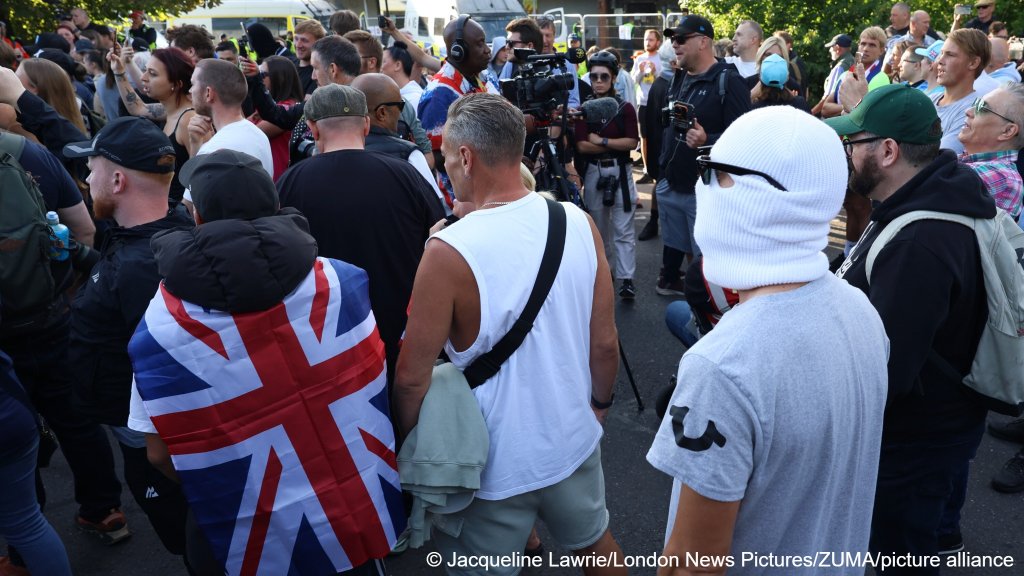
According to Philp, the British press is reporting on alleged crimes committed by migrants housed in the hotels. According to the right-wing tabloid The Sun, they unearthed "339 charges in the last six months based on only half the hotels currently operated."
According to the minister, "these crimes included multiple cases of rape, sexual assault, violence, theft and arson, including the case that the minister referred to in Epping, where a 38-year-old Ethiopian man has been charged with sexually assaulting a 14-year-old girl."
Philp continued that "an illegal immigrant in Oxford has been convicted of raping a 20-year-old woman in a churchyard." And, "a Sudanese man was convicted of strangling and attempting to rape a woman in a nightclub toilet in Wakefield."
Philp said because of these reports, the "public are rightly sick of this illegal immigrant crime wave," and called for it "to end."
Read AlsoUK asylum system under scrutiny for severe housing failures
Latest asylum statistics
The UK government’s latest asylum statistics, updated on June 25 and covering the year ending March 2025, show that 109,000 people applied for asylum in that period -- an increase of 17 percent compared to the year ending March 2024 and surpassing the previous peak of 103,000 in 2002.
However, in 2024, just under a third of asylum seekers arrived in the UK on a small boat, slightly more than a third traveled to the UK on a visa, and subsequently claimed asylum.
In 2024, the UK received the fifth largest number of asylum seekers in the wider EU bloc, after Germany, Spain, Italy and France. In the year ending March 2025, around half of all decisions were granted asylum. At the end of March 2025, the UK government said there were 79,000 cases awaiting an initial decision, 9 percent fewer than at the end of March 2024.
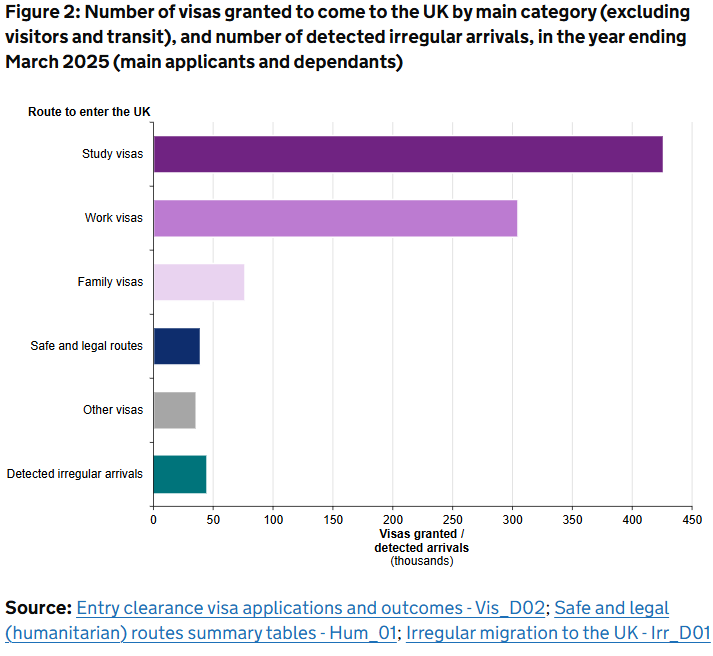
A graph published by the government shows that irregular arrivals account for fewer than 50,000 of those who enter the UK. The vast majority of migrants enter the country with either a study, work or family visa.
